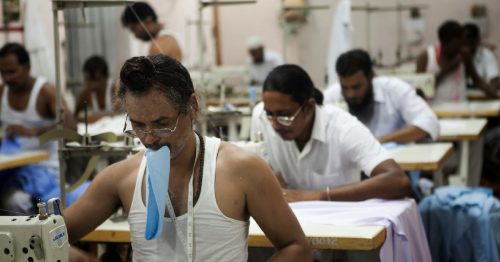Five Prisons Across India That Are Actually Rehabilitating Inmates
Life in an Indian prison is often intolerable with little scope for a productive future. These prisons are hoping to change that notion.

Life in an Indian prison is often an oppressive affair, especially if you are poor. Problems stem from inadequate infrastructure, living conditions (general hygiene, sanitation and food, among others) and the brutal violence that inmates suffer at the hands of both their fellow prisoners and jail officials.
Those who don’t have the necessary means to pay for legal aid often languish in jails for years as undertrials. Earlier this year, the Supreme Court took cognizance of unnatural deaths in prisons and asked all High Courts to register a Suo Moto Public Interest Litigation to identify the kin of those who died in jails, from 2012 to 2015, and offer them with the necessary compensation.

Despite these concerns, there are prisons in the country that are doing their bid to help inmates experience a better life inside, promoting activities or initiatives, and preparing them for the world outside. Here are five prisons doing their bid to make the lives of inmates a lot tolerable.
Taloja Jail, Navi Mumbai:
In a heartwarming initiative, authorities in the Taloja Jail, Navi Mumbai, are offering inmates a chance to spend time with their children and other loved ones without having a glass or wall separating them. This is part of the ‘gala bhet’ initiative that the State Prison Department started last year.
There are approximately 300 convicts in the jail, not serving sentences more than five years. “Many times, prisoners feel depressed and worried about their families. Some also tend to get suicidal, and purpose of this programme is to bring positivity during their incarceration,” said Jail Superintendent Sadanand Gaikwad to The Hindu.
Children under 16 years of age can visit their parents, while those too young can visit with a relative to accompany them. “When a man is convicted, the bond between father and child goes for a toss. Maintaining the relationship is important, and this way, we give them a chance to stay connected,” he added.

Poojapura Central Prison, Thiruvananthapuram:
A critical question before society is whether prisons are set up for punishment or rehabilitation. In the recent past, many prisons across India have offered avenues for prisoners to rehabilitate themselves under various vocational training programmes.
The Poojappura Central Prison in Thiruvananthapuram is offering many self-employment training programmes. Last month, 22 inmates and three former prisoners were cleared for driving licenses, reported The New Indian Express.
The prison also offers training in the basics of computers and paper-bag-making, besides courses in beautician training and screen painting, where inmates sit in batches of 25. Assistance for these courses come from the Central Polytechnic, Vattiyoorkavu, and Women’s Polytechnic, Kaimanam.
The prison has already sent its list of additional courses it would like to conduct, to authorities in the Central Jail, including one in travel and tourism. “Prisoners who join such courses are found to be calm and composed,” said a jail official. “One of them has approached us seeking advice to set up a paper bag manufacturing unit in his hometown.”
Central Prison, Kannur:
In a unique venture, the Central Prison in Kannur, Kerala, opened a beauty parlour exclusively for men called Phoenix Freedom Expressions. Thirty inmates, who have undergone extensive training, run the show, according to The Hindu. Last year, the Director General of Prisons inaugurated the facility within prison premises.
Training for various jobs is necessary for inmates to earn a livelihood once they are done serving their sentence. The inmates manning this parlour underwent a 30-day training course conducted by the Rural Development and Self Employment Training Institute in Kannur. Services provided in this prison parlour include hair-dressing and facials, among others.
Tihar Jail, New Delhi:
Among other initiatives, the notorious Tihar jail in the nation’s capital started a small automotive manufacturing unit run by prison inmates, which provides them with the necessary training to acquire future employment opportunities.
The prison also hosts a restaurant for the public with a seating capacity of 45, where the food is cooked and served by jail convicts. Prisoners staffing the restaurant are those mostly charged with murder but have over time shown themselves to be model inmates.
On its website, there a variety of products that Tihar Jail Factory claims to promote including “bakery products, handloom and textiles, furniture, pure mustard oil, apparel, recycled hand-made paper products, paintings, designer candles and lamps, jute bags, herbal products and many more.”
The prison store also makes cookies, pickles, potato chips and clothing, and the entire operation is manned by inmates.

Balasore District Jail, Odisha:
One of the oldest prisons in the state is hoping to implement an organic farming venture as an attempt to increase not only its earnings but also aid inmates in learning skills that they could take with them to the outside world.
With over five acres of land available on the premises, jail authorities are planning to establish a site for organic farming. Currently, inmates grow vegetables and rice on this piece of land using conventional chemical-based farming methods.
It is a productive venture with the land producing vegetables worth ₹3 lakh annually. Jail authorities believe that the transition to organic farming will increase output by three or four times with the prison authorities confident of providing necessary material for vermicompost generation.
Like this story? Or have something to share? Write to us: [email protected], or connect with us on Facebook and Twitter.
NEW: Click here to get positive news on WhatsApp!
This story made me
- 97
- 121
- 89
- 167
Tell Us More
We bring stories straight from the heart of India, to inspire millions and create a wave of impact. Our positive movement is growing bigger everyday, and we would love for you to join it.
Please contribute whatever you can, every little penny helps our team in bringing you more stories that support dreams and spread hope.



















